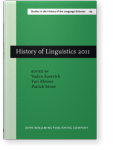Soviet linguistics and world linguistics
Soviet linguistics was always part of world science, influenced by global processes. The transition to structuralism took place in the Soviet Union as well. The two main schools of those years, the Leningrad and Moscow schools, belonged to the structural paradigm, although the term ‘structuralism’ was not adopted at that time. The gap between Soviet and world linguistics was not as great as it is now considered to be, because Soviet scholars were informed about the developments in Western linguistics. It was much harder to gain recognition in the West. The ideas of Western structural linguistics began to penetrate into Soviet scholarship in the second half of the 1950s. Soviet structuralism, however, developed into a separate trend, which did not constitute a unity. The influence of generative linguistics in its canonical form prior to the 1990s was not significant.
